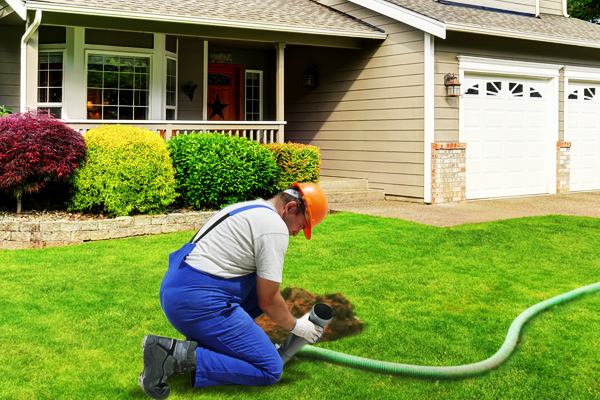
11
When it comes to your home’s septic system, a little regular care can go a long way in keeping things running smoothly. While some maintenance tasks are safe for homeowners to handle, others should always be left to professionals. Understanding the difference can save you money, prevent costly damage, and extend the life of your septic system. Here’s what you can do when it comes to DIY septic maintenance.
One of the simplest ways to maintain your septic system is by watching what you flush or pour down the drain. Only human waste and toilet paper should go into your toilet—never wipes, paper towels, feminine hygiene products, or grease. In the kitchen, avoid sending food scraps, oils, or harsh chemicals into your drains, as these can clog pipes and upset the bacterial balance inside the tank.
Excess water can overload your septic system, preventing solids from settling and forcing untreated wastewater into the drain field. Install water-saving fixtures like low-flow toilets and faucets, and try to spread out laundry loads throughout the week instead of doing several back-to-back. Every drop counts when it comes to septic health.
Your drain field plays a vital role in filtering and dispersing wastewater. Keep this area clear—never park vehicles, plant trees, or build structures on it. Roots can damage pipes, and compacted soil can block proper drainage. Regularly inspect the area for soggy patches or foul odors, as these can signal a problem that needs professional attention.
Harsh household cleaners and antibacterial soaps can kill the beneficial bacteria your septic system depends on. Choose biodegradable, septic-safe cleaning products and detergents instead. You can also use enzyme-based additives occasionally to help maintain a healthy bacterial balance, though these should never replace professional septic tank cleaning.
While these simple maintenance habits go a long way toward keeping your septic system healthy, there’s a limit to what homeowners can safely do on their own. Some tasks require specialized equipment, expert knowledge, and a deep understanding of how your system works beneath the surface. That’s where the professionals come in.
Even with great habits, every septic system eventually needs septic tank pumping. Over time, solids build up in the tank and must be removed to prevent backups and drain field damage. This job requires specialized equipment and safety precautions, so it’s best left to experts like Charlotte Septic Pros. Most homeowners should schedule septic pumping every three to five years, depending on household size and water use.
If you notice slow drains, gurgling sounds, sewage odors, or standing water near your drain field, it’s time to call a professional. Attempting DIY repairs can worsen the problem or even violate local health regulations. Licensed technicians can locate and fix issues safely, often using camera inspections to pinpoint problems before they escalate.
Installing or replacing a septic tank requires permits, engineering knowledge, and heavy machinery. This is definitely not a weekend DIY project. Professionals ensure your system meets local codes, is properly sized, and functions efficiently.
Your septic system is one of the most important and expensive parts of your home’s infrastructure. Regular septic tank pumping and cleaning by trained technicians help prevent blockages, overflows, and system failure. Professionals can spot early signs of wear and recommend solutions before small issues turn into major repairs.
At Charlotte Septic Pros, our experts are dedicated to keeping your septic system healthy and efficient. From routine septic pumping to thorough septic tank cleaning, we provide dependable service you can trust. Call us for any septic inconvenience you have, and we’ll be right there!

22
Can Bacteria Additives Eliminate the Need for Pumping? If you own a home with a septic system, you’ve probably seen…
Read more
12
A single slow drain in your home can feel like a minor inconvenience. Maybe the sink takes a little longer…
Read more
05
Are Slow Drains a Septic Issue or Just a Clog? Slow drains are one of those household problems that start…
Read more
02
What Septic Service Techs See That Homeowners Miss Most homeowners only think about their septic system when something goes wrong.…
Read more
21
Simple Habits That Protect Your Septic System A well-functioning septic system does its job quietly, but the moment something goes…
Read more
14
Pump Now or Pay Later: The Real Cost of Skipping Maintenance A properly functioning septic system is easy to forget…
Read more
11
Why Your Septic System Always Acts Up at the Worst Time Homeowners often feel that septic problems strike at the…
Read more
04
Early Warning Signs Your Septic Tank Needs Pumping For homeowners who rely on a septic system, routine maintenance is not…
Read more
29
Why Does My Septic System Smell Fine One Day and Terrible the Next? If you own a home with a…
Read more
19
Is Your Septic System Overdue? Simple Home Checks You Can Do Today For many homeowners, the septic system is a…
Read more